{{model.PromotionText}}
-
Money -
Top-Ups -
Gift Cards -
Log In -
Sign Up
Simbang Gabi: A Filipino Christmas Tradition Rooted in Faith and Community Title
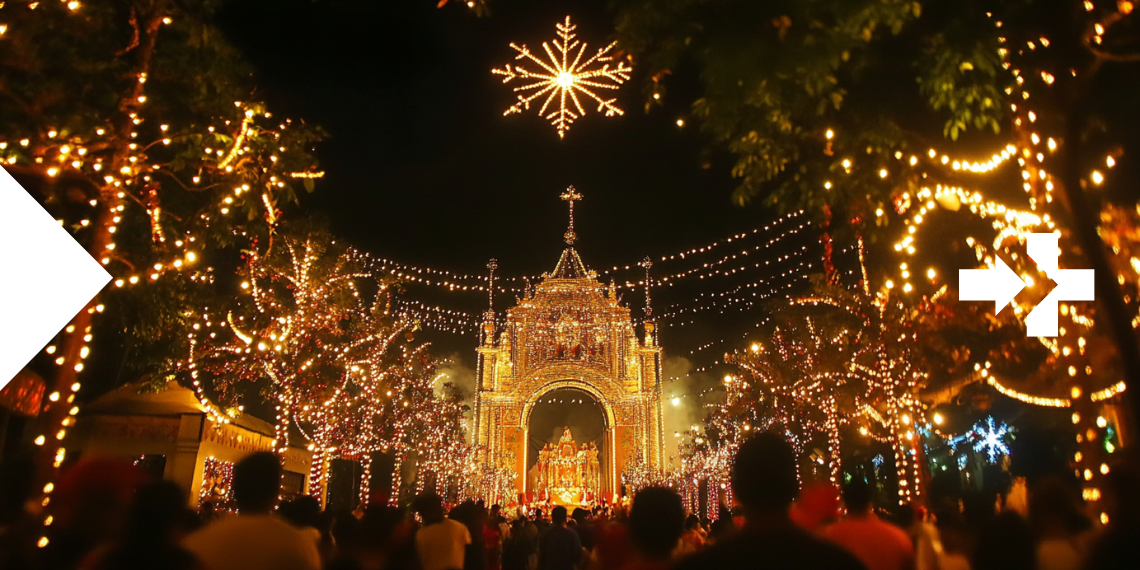
-
Categories
-
{{category.Title}}
Write a comment
Simbang Gabi: A Filipino Christmas Tradition Rooted in Faith and Community
The Christmas season in the Philippines transcends festive celebrations—it is a deeply ingrained cultural and spiritual journey. Among the most treasured Filipino traditions leading up to Christmas Day is Simbang Gabi, a nine-day series of pre-dawn Masses that starts on December 16 and concludes on December 24. This enduring practice symbolizes hope, unwavering faith, and the strength of communal bonds, uniting Filipinos in a shared spiritual experience.
Throughout the years, it has evolved into a cherished religious and cultural celebration, reflecting the Filipino people's resilience, devotion, and love for family and community. The tradition’s unique blend of solemn worship and festive cheer creates an atmosphere unlike any other, making the anticipation of Christmas even more meaningful.
Origins of Simbang Gabi: A Legacy of Faith and Cultural Resilience
The roots of Simbang Gabi trace back to 1669, during the Spanish colonial era in the Philippines. Filipino farmers, bound by the demands of agricultural labor from dawn until dusk, struggled to attend traditional evening Masses. In response, Spanish missionaries introduced pre-dawn Masses, allowing the faithful to worship before beginning their long workdays. This thoughtful adaptation blossomed into a deeply cherished religious custom that has since become an integral part of Filipino cultural heritage.
Originally called Misa de Aguinaldo or Misa de Gallo (Rooster's Mass), these early morning services symbolized spiritual preparedness and devotion. The term "Misa de Gallo" comes from the belief that roosters would crow at dawn, signaling the start of the Mass.
The Masses were not just religious observances but also communal gatherings that strengthened social bonds among villagers. Communities would come together under starlit skies, with churches decorated with native lanterns known as paróls, symbolizing the Star of Bethlehem that guided the Wise Men to the manger.
Despite interruptions in its observance due to colonial regulations, the practice persisted. In 1953, the First Plenary Council of the Philippines petitioned the Vatican to formalize Simbang Gabi as part of the Filipino liturgical calendar, a request officially granted in 1961. This acknowledgment solidified its significance as a unique religious and cultural tradition.
Today, Simbang Gabi continues to thrive, with celebrations extending beyond church grounds into communities and homes. Its enduring legacy highlights the resilience, devotion, and unity that define Filipino spirituality.
Simbang Gabi 2024: Continuing the Legacy and Collective Celebration
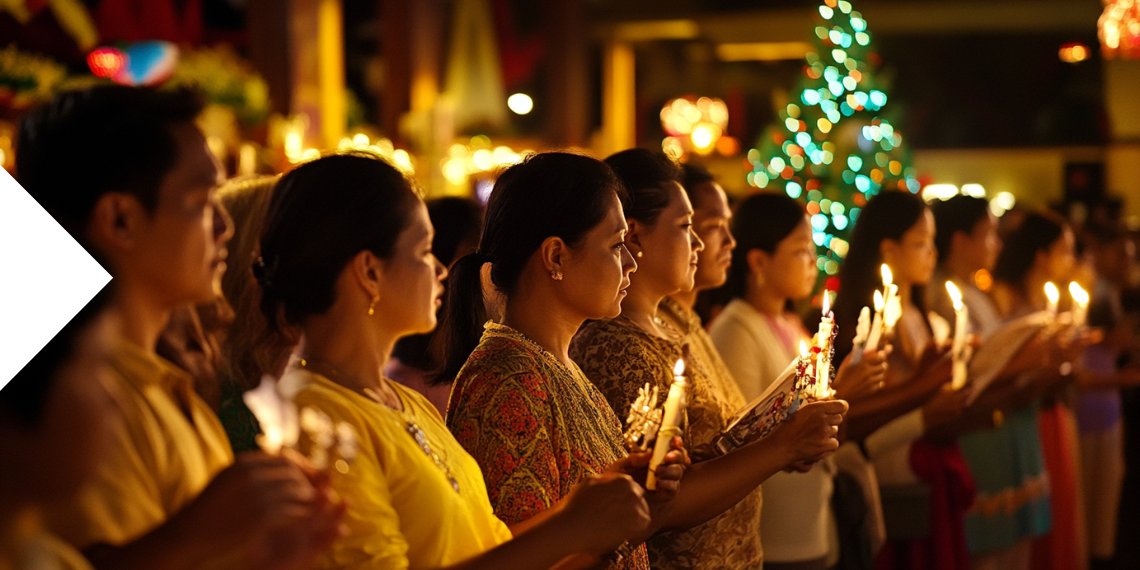
As December unfolds, the Simbang Gabi 2024 season is already in full swing. Churches across the Philippines and Filipino communities abroad are immersed in the spiritually enriching nine-day journey toward Christmas Day. The Masses, often held at dawn around 4:00 a.m., resonate with solemn hymns, heartfelt prayers, and Scripture readings that echo the Advent season’s profound message of hope and anticipation.
In urban areas, where modern life and demanding schedules can make dawn Mass attendance challenging, anticipated evening celebrations from December 15 to 23 have become widely practiced. Despite the adjustments, the spiritual essence of Simbang Gabi—its call for faith, perseverance, and communal unity—remains steadfast.
The atmosphere is unparalleled. Before dawn, church bells ring with a resonant call to gather the faithful. Streets leading to churches come alive with processions of devotees holding candles, their faces illuminated with joy and devotion.
The Masses themselves are marked by the uplifting Gloria hymn—a joyful proclamation sung even though Advent is traditionally a solemn season. Churches are adorned with dazzling paróls (star-shaped Christmas lanterns), symbolizing the Star of Bethlehem that guided the Wise Men to the manger.
Many churches also include symbolic processions featuring representations of the Holy Family, shepherds, and angels, adding a visually rich narrative to the liturgical experience. The faithful participate with fervent prayers, responding to the priest’s blessings with resounding "Amens" that echo through the holy sanctuaries.
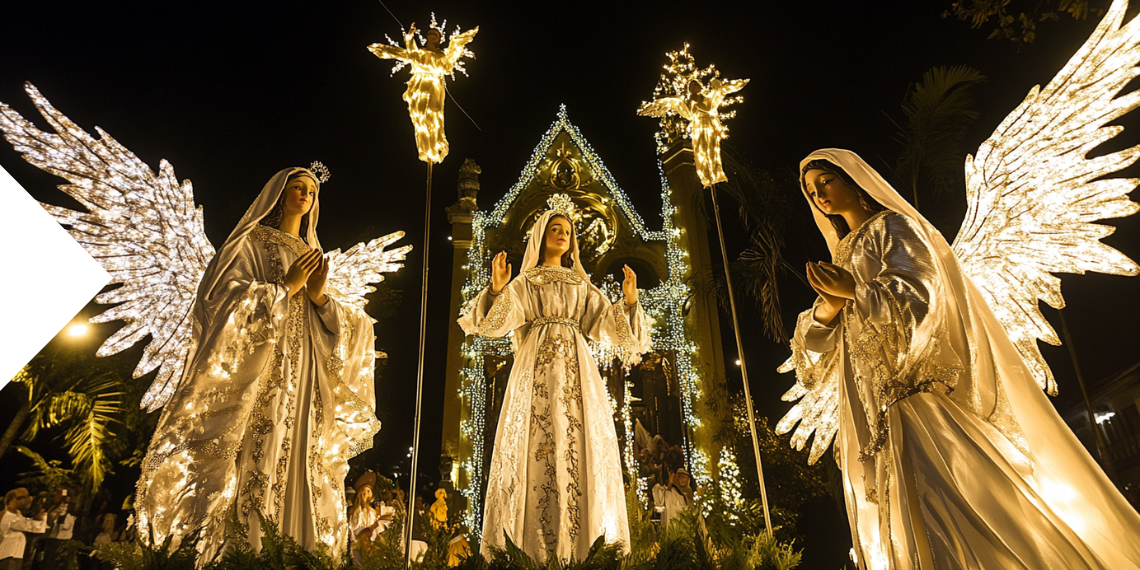
Devotees hold a deep-seated belief that completing all nine days of Simbang Gabi earns them special blessings. This conviction transforms the tradition into a profoundly inspiring spiritual journey, filled with personal petitions, thanksgiving for past blessings, and heartfelt prayers for health, guidance, and prosperity in the year ahead.
Even amidst life's complexities, it stands as a beacon of spiritual renewal, collective hope, and enduring faith—a tradition deeply rooted in the heart of the Filipino people, uniting communities across continents.
A Global Celebration of Faith and Community
Filipinos around the world continue to honor this beloved tradition even in distant lands. Wherever there are Filipino communities, the spirit of Simbang Gabi comes alive, transforming chapels, churches, community centers, and even private homes into places of worship filled with prayer, song, and cultural pride.
In 2019, Pope Francis celebrated Simbang Gabi at the Vatican, underscoring its universal spiritual significance and its deep roots in the global Catholic community. His participation marked a milestone, affirming that it transcends geographical boundaries and resonates with Catholics everywhere.
From the United States and Canada to countries in Europe, the Middle East, and Asia-Pacific, Filipino expatriates and migrant workers gather in solemn devotion. In major cities like Los Angeles, Dubai, London, and Singapore, Filipino parishes organize nine-day Masses that mirror the celebrations back home. These services often feature traditional Filipino choirs, paróls, and festive communal meals.
Beyond religious observance, Simbang Gabi abroad fosters a profound sense of cultural identity and community spirit. For many, it offers comfort and connection during the holiday season, especially for those far from home. Families reunite, friends reconnect, and new bonds are formed through shared faith and tradition.
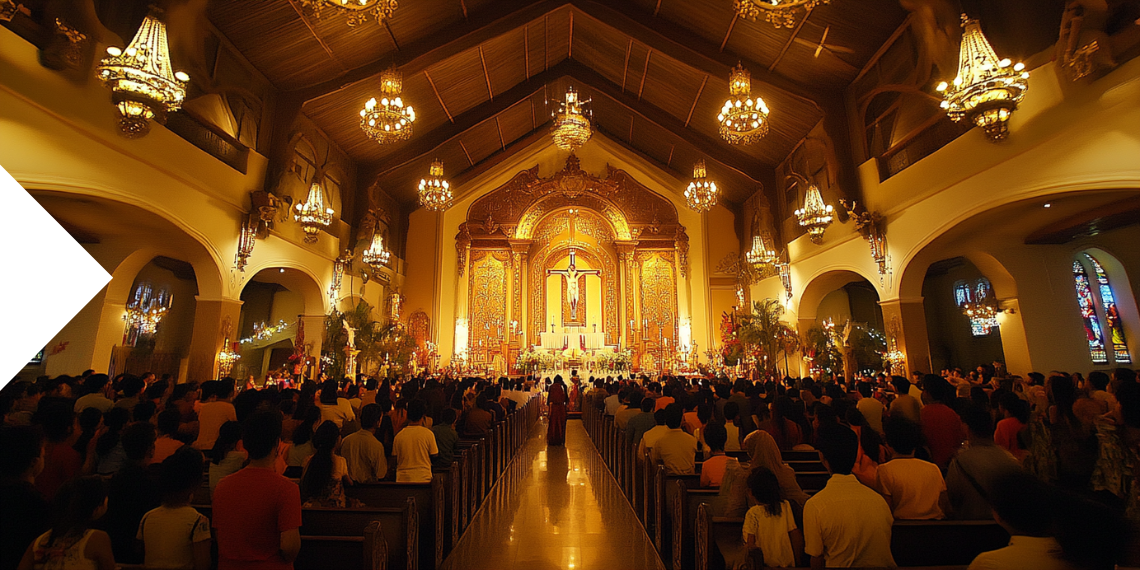
These international celebrations also become avenues for cultural exchange, introducing Simbang Gabi's beauty to non-Filipino friends and neighbors. Its enduring appeal lies in its universal themes of hope, gratitude, and joyful anticipation, making it not only a distinctly Filipino custom but also a celebration that resonates with people of all backgrounds.
Cultural Flavors: Festive Delicacies After Mass
No celebration of Simbang Gabi is complete without indulging in traditional Filipino delicacies that evoke warmth, nostalgia, and community spirit. After Mass, churchyards and nearby streets come alive with the enticing aroma of freshly prepared treats, drawing worshippers into a festive post-service gathering.
Among the most iconic delicacies are bibingka (rice cakes cooked in clay ovens lined with banana leaves) and puto bumbong (steamed purple rice pastries topped with butter, grated coconut, and muscovado sugar). These sweet treats, often paired with tsokolate (thick hot chocolate made from local cacao) or salabát (spicy ginger tea), create a comforting culinary experience unique to the Christmas season.
The communal meal after Mass reinforces the Filipino values of family, friendship, and generosity. Vendors, many of whom rely on this seasonal income, often share stories of how their sales support their families and fund their children’s education, making this tradition an economic blessing as much as a spiritual one.
Other popular holiday favorites include suman (sticky rice wrapped in banana leaves), arroz caldo (a hearty chicken and rice porridge), and kutsinta (soft, sticky rice cakes). Latik (coconut caramel topping), yema (sweet custard candy), and crispy barquillos (rolled wafer cookies) are also frequently enjoyed.
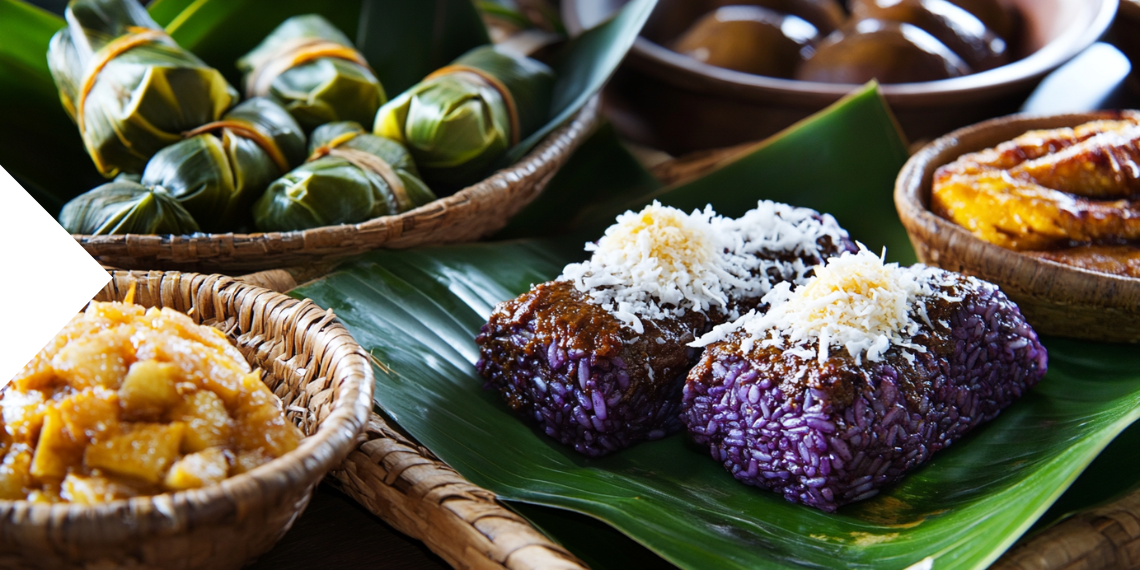
The simple act of sharing these delicacies reflects the Filipino spirit of hospitality and community, where everyone—friends, family, and even strangers—is invited to partake in the joy and warmth of the season. It’s a sensory and spiritual feast that keeps the Christmas spirit burning brightly long after the dawn Masses conclude.
A Season of Connection, Faith, and Community
Beyond its religious beginnings, Simbang Gabi 2024 has grown into a much-loved cultural custom that helps communities all across the world come together. Its harmonious fusion of communal gatherings, religious devotion, and celebratory customs is a prime
example of the Filipino identity's persistence and enduring strength of faith.
As Christmas approaches, the season is a timeless representation of charity, hope, and joy for everybody. The deep significance of this holy festival unites
people and creates a strong sense of unity and belonging, whether they attend dawn Masses in the Philippines or observe the custom in other countries.
Keeping in touch with loved ones becomes even more important as Filipinos around the world celebrate Simbang Gabi 2024. By enabling Filipinos living overseas to provide for their family at this treasured time of year, we at sendvalu take pride in fostering these relationships. No matter how far away they reside, sendvalu helps families stay connected by providing financial assistance for holiday preparations or enabling loved ones to take part in festive celebrations.
Maligayang Pasko! (Merry Christmas!)



Any Questions?
We are more than happy to help you!Help & Support
Company
¹ All delivery times are based on average transaction times over the last three months. Please note that due to verification policies, new customers may experience longer delivery times. ² Prices might vary based on selection of payout option.
Send money worldwide
© Copyright 2025 AWS Malta Ltd.
Follow us:


Leave a comment